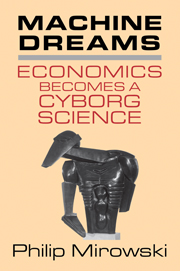Book contents
- Frontmatter
- Contents
- List of Figures and Tables
- Acknowledgments
- List of Abbreviations
- 1 Cyborg Agonistes
- 2 Some Cyborg Genealogies; or, How the Demon Got Its Bots
- 3 John von Neumann and the Cyborg Incursion into Economics
- 4 The Military, the Scientists, and the Revised Rules of the Game
- 5 Do Cyborgs Dream of Efficient Markets?
- 6 The Empire Strikes Back
- 7 Core Wars
- 8 Machines Who Think versus Machines That Sell
- Envoi
- References
- Index
3 - John von Neumann and the Cyborg Incursion into Economics
Published online by Cambridge University Press: 05 June 2012
- Frontmatter
- Contents
- List of Figures and Tables
- Acknowledgments
- List of Abbreviations
- 1 Cyborg Agonistes
- 2 Some Cyborg Genealogies; or, How the Demon Got Its Bots
- 3 John von Neumann and the Cyborg Incursion into Economics
- 4 The Military, the Scientists, and the Revised Rules of the Game
- 5 Do Cyborgs Dream of Efficient Markets?
- 6 The Empire Strikes Back
- 7 Core Wars
- 8 Machines Who Think versus Machines That Sell
- Envoi
- References
- Index
Summary
At Princeton, where in 1933 von Neumann at 29 became the youngest member of the newly established Institute for Advanced Study, the saying gained currency that the Hungarian mathematician was indeed a demigod but that he had made a thorough, detailed study of human beings and could imitate them perfectly.
Richard Rhodes, The Making of the Atomic BombOur explicit narrative of the constitution of modern economics begins with John von Neumann because I believe, with the benefit of a little additional hindsight and the provision of some previously neglected evidence, he will come to be regarded as the single most important figure in the development of economics in the twentieth century. It would initially appear I am not alone in this conviction. Roy Weintraub (1985, p. 74), suggests, “Von Neumann's [1937] paper is, in my view, the single most important article in mathematical economics.” Mohammed Dore (in Dore, Chakravarty, & Goodwin, 1989, p. 239) asserts that “John von Neumann changed the way economic analysis is being done.” Nicholas Kaldor ventured, “He was unquestionably the nearest thing to a genius I have ever encountered” (ibid., p. xi). Jurg Niehans's textbook (1990, p. 393) states flatly, “In the second quarter of the twentieth century, it happened for the first time that a mathematical genius made fundamental contributions to economic theory.” Given the spread of game theory throughout the core microeconomics curriculum since 1980, it would appear a foregone conclusion that von Neumann should be revered as the progenitor of that tradition and, thus, of microeconomic orthodoxy at the end of this century.
- Type
- Chapter
- Information
- Machine DreamsEconomics Becomes a Cyborg Science, pp. 94 - 152Publisher: Cambridge University PressPrint publication year: 2001



